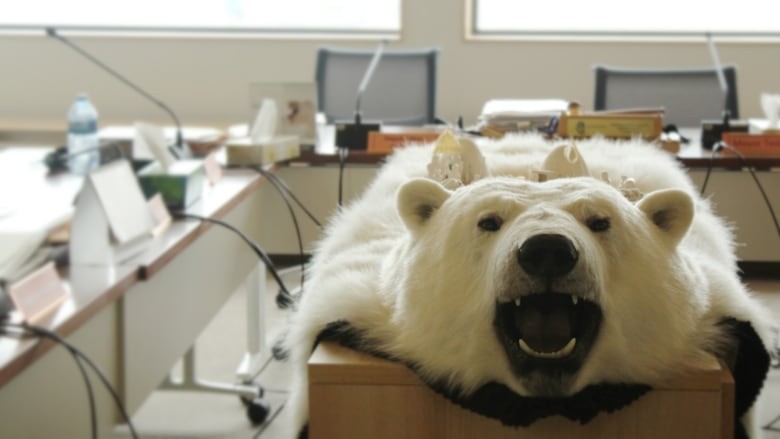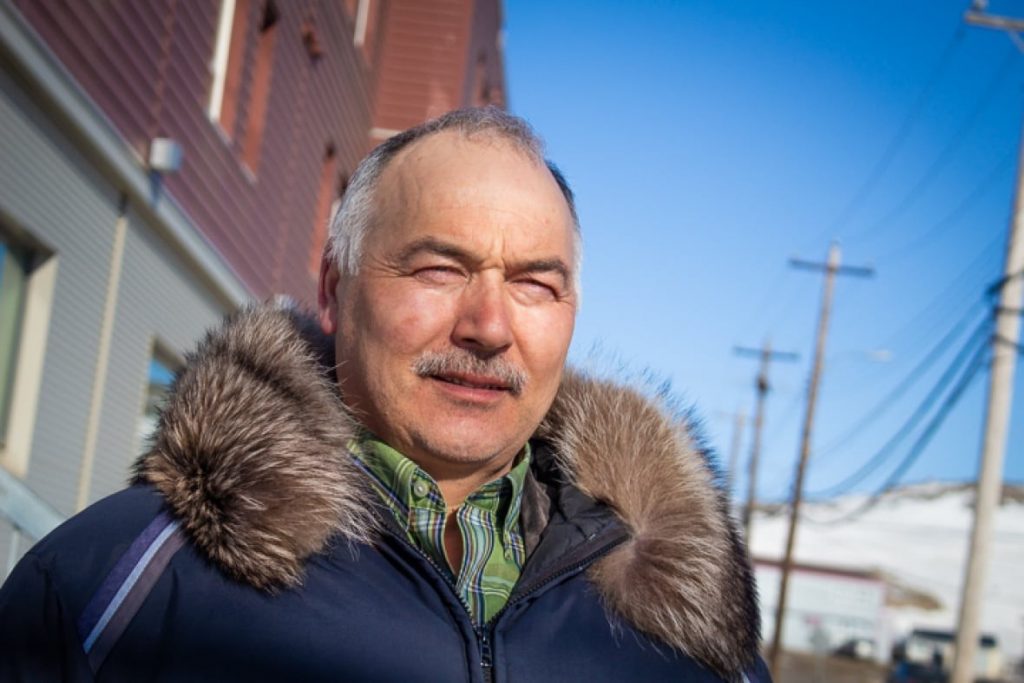Over 200 Nunavut polar bear hides coming back home from Ontario

Over 200 polar bear hides are on their way home to Nunavut from an Ontario auction house where they have been stuck in storage — some for up to a decade.
The return comes after the Fur Harvesters Auction in North Bay, Ont., accumulated a stock of around 300 untanned Nunavut polar bear hides that it couldn’t sell. The territory says it’s about 235 hides.
A quality polar bear hide used to sell for between $12,000 and $20,000, but now a large and high grade hide goes for $5,000 at the most, says Edwin Ferguson, a fur technician.
When that market fell, buyers stopped looking for small bears.
“There’s a market for bigger bears. Anything nine feet and up you can sell very readily as long as they’re decent quality. But anything under that eight foot level is very hard to sell,” Ferguson said.
Many of the bears coming home are under that benchmark, he said.
Premier Joe Savikataaq, who is also the environment minister, and says the skins shouldn’t be abandoned.
“By reclaiming the backlog of hides from Fur Harvesters Auction, we ensure that Nunavut polar bear hides do not degrade in quality simply to sit in storage,” Savikataaq said in the Legislative Assembly on Monday.
Paid for, or given back
Because of low prices and low demand at auction, the department is telling hunters to sell their polar bear hides privately, or to keep them for traditional use.
MLAs have often asked Savikataaq about the bear hides, saying their constituents want to be paid for the bears, or get them back.
Hunters can get their bears by giving back the advance the government paid them for the hide in the first place.
But the advance could have been up to $3,000. Ferguson says, many of the untanned bear hides are no longer worth that much.
The Fur Harvesters Auction is sending them back because, under its contract with the government of Nunavut, the bears can’t be sold at a loss.
That’s why bear skins that hunters don’t want will be sold to the public or given to non-profits for community use.
“Let’s keep our traditions and culture sustainable, and use this global downturn to benefit our communities instead,” Savikataaq said.

Ferguson guessed that many of the hides sent back to the territory will be hard to use whole.
When they’re kept in storage for a long time, even at the right temperature, the untanned furs do get course because the hairs gets hollow the longer a skin dries, he said.
Another set of those hides are in good shape, he said, but couldn’t be sold internationally because they were hunted during the early 2000s when some Nunavut bears were banned from export for political reasons.
Ferguson says bear prices were high around the same time, because there were concerns that selling polar bears would become illegal.
“Everybody thought that they were going to stop us trading in them. The world did not want us to sell a polar bear to anybody. They hate the fact that they are killed and sold,” he said. “That drove the market crazy for two or three years.”
Auction still accepting Nunavut hides
The Fur Harvesters Auction kept any bear hides it knew it could sell for at least the advance money.
Ferguson says the auction is still accepting Nunavut hides to sell on behalf of hunters, but he recommends being picky about which bear you send.
He says the “big and beautiful” trophy bears get the best price internationally. Before shipping a bear, it should be washed of all stains, and dried well so it won’t get mouldy when it’s being shipped.
The hides make more money if they still have the head, with an unbroken jaw, and paws with claws that are needed to make a taxidermy rug, he said.
In its next April sale, the Fur Harvesters Auction expects to market over 100 polar bear hides from Nunavut and Northwest Territories.
Related stories from around the North:
Canada: Survey data sheds light on Indigenous languages, traditional activities across Canada’s North, CBC News
Greenland/Denmark: Greenland and Denmark finalize cooperation agreement on marine pollution response, Eye on the Arctic
Finland: Miners hunting for metals to battery cars threaten Finland’s Sámi reindeer herders’ homeland, Yle News
Iceland: Arctic Science Ministerial postponed to 2021 due to COVID-19, Eye on the Arctic
Norway: Unusual amounts of snow and ice threaten reindeer in Arctic Norway, The Independent Barents Observer
Russia: Record-warm Arctic summer fatal to wild reindeer in Russia, say environmentalists, The Independent Barents Observer
Sweden: Sweden bans mink breeding in 2021 in fight against coronavirus pandemic, Reuters
United States: Biden, Trudeau agree to ‘safeguard’ caribou calving grounds in Alaska refuge, CBC News



